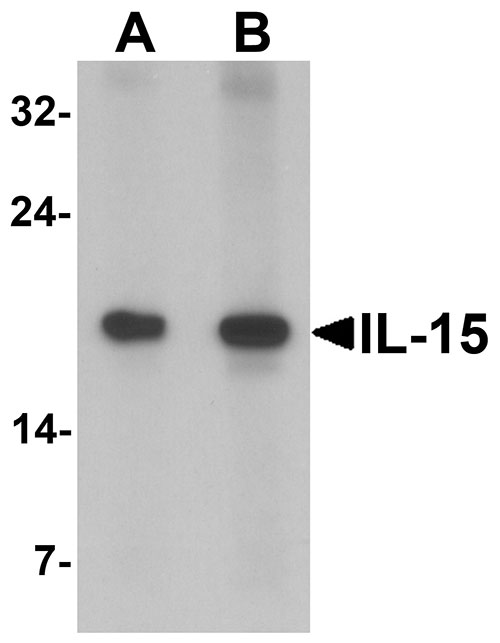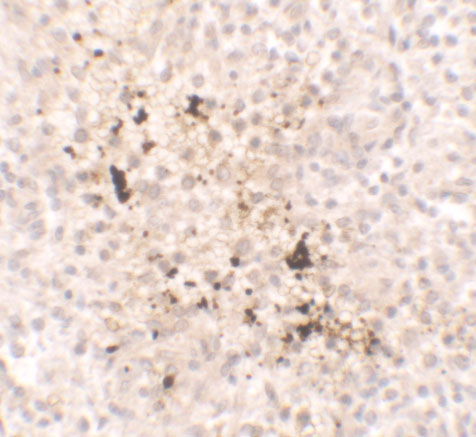IL-15 Antibody
- SPECIFICATION
- CITATIONS
- PROTOCOLS
- BACKGROUND

Application
| WB, IHC-P, E |
|---|---|
| Primary Accession | P40933 |
| Other Accession | NP_000576, 10835153 |
| Reactivity | Human, Mouse, Rat |
| Host | Rabbit |
| Clonality | Polyclonal |
| Isotype | IgG |
| Calculated MW | 18 kDa |
| Application Notes | IL-15 antibody can be used for detection of IL-15 by Western blot at 1 - 2 µg/mL. |
| Gene ID | 3600 |
|---|---|
| Target/Specificity | IL15; At least two isoforms of IL-15 are known to exist. |
| Reconstitution & Storage | IL-15 antibody can be stored at 4℃ for three months and -20℃, stable for up to one year. |
| Precautions | IL-15 Antibody is for research use only and not for use in diagnostic or therapeutic procedures. |
| Name | IL15 |
|---|---|
| Function | Cytokine that plays a major role in the development of inflammatory and protective immune responses to microbial invaders and parasites by modulating immune cells of both the innate and adaptive immune systems (PubMed:15123770). Stimulates the proliferation of natural killer cells, T-cells and B-cells and promotes the secretion of several cytokines (PubMed:8178155, PubMed:9326248). In monocytes, induces the production of IL8 and monocyte chemotactic protein 1/CCL2, two chemokines that attract neutrophils and monocytes respectively to sites of infection (PubMed:9326248). Unlike most cytokines, which are secreted in soluble form, IL15 is expressed in association with its high affinity IL15RA on the surface of IL15-producing cells and delivers signals to target cells that express IL2RB and IL2RG receptor subunits (PubMed:10233906, PubMed:23104097, PubMed:8026467). Binding to its receptor triggers the phosphorylation of JAK1 and JAK3 and the recruitment and subsequent phosphorylation of signal transducer and activator of transcription-3/STAT3 and STAT5 (PubMed:7568001). In mast cells, induces the rapid tyrosine phosphorylation of STAT6 and thereby controls mast cell survival and release of cytokines such as IL4 (By similarity). |
| Cellular Location | [Isoform IL15-S48AA]: Secreted. |
| Tissue Location | Most abundant in placenta and skeletal muscle. It is also detected in the heart, lung, liver and kidney. IL15-S21AA is preferentially expressed in tissues such as testis and thymus |

Thousands of laboratories across the world have published research that depended on the performance of antibodies from Abcepta to advance their research. Check out links to articles that cite our products in major peer-reviewed journals, organized by research category.
info@abcepta.com, and receive a free "I Love Antibodies" mug.
Provided below are standard protocols that you may find useful for product applications.
Background
IL-15 Antibody: Interleukin 15 (IL-15) is a cytokine that regulates T and natural killer cell activation and proliferation. This cytokine and IL-2 share many biological activities as both have been found to bind common hematopoietin receptor subunits, and may compete for the same receptor, and thus negatively regulate each other's activity. The number of CD8+ memory cells is shown to be controlled by a balance between IL-15 and IL-2. This cytokine induces the activation of JAK kinases, as well as the phosphorylation and activation of transcription activators STAT3, STAT5, and STAT6. In mouse, studies suggest that IL-15 may increase the expression of apoptosis inhibitor Bcl-xL, possibly through the transcription activation activity of STAT6, and thus prevent apoptosis.
References
Bodnar A, Nizsaloczki E, Mocsar G, et al. A biophysical approach to IL-2 and IL-15 receptor function: localization, conformation and interactions. Immunol. Lett. 2008; 116:117-25.
Ku CC, Murakami M, Sakamoto A, et al. Control of homeostasis of CD8+ memory T cells by opposing cytokines. Science 2000; 288:675-8.
Waldmann T, Tagaya Y, and Bamford R. Interleukin-2, interleukin-15, and their receptors. Int. Rev. Immunol. 1998; 16:205-26.
Masuda A, Matsuguchi T, Yamaki K, et al. Interleukin-15 prevents mouse mast cell apoptosis through STAT6-mediate Bcl-xL expression. J. Biol. Chem. 2001; 276:26107-13.
If you have used an Abcepta product and would like to share how it has performed, please click on the "Submit Review" button and provide the requested information. Our staff will examine and post your review and contact you if needed.
If you have any additional inquiries please email technical services at tech@abcepta.com.













 Foundational characteristics of cancer include proliferation, angiogenesis, migration, evasion of apoptosis, and cellular immortality. Find key markers for these cellular processes and antibodies to detect them.
Foundational characteristics of cancer include proliferation, angiogenesis, migration, evasion of apoptosis, and cellular immortality. Find key markers for these cellular processes and antibodies to detect them. The SUMOplot™ Analysis Program predicts and scores sumoylation sites in your protein. SUMOylation is a post-translational modification involved in various cellular processes, such as nuclear-cytosolic transport, transcriptional regulation, apoptosis, protein stability, response to stress, and progression through the cell cycle.
The SUMOplot™ Analysis Program predicts and scores sumoylation sites in your protein. SUMOylation is a post-translational modification involved in various cellular processes, such as nuclear-cytosolic transport, transcriptional regulation, apoptosis, protein stability, response to stress, and progression through the cell cycle. The Autophagy Receptor Motif Plotter predicts and scores autophagy receptor binding sites in your protein. Identifying proteins connected to this pathway is critical to understanding the role of autophagy in physiological as well as pathological processes such as development, differentiation, neurodegenerative diseases, stress, infection, and cancer.
The Autophagy Receptor Motif Plotter predicts and scores autophagy receptor binding sites in your protein. Identifying proteins connected to this pathway is critical to understanding the role of autophagy in physiological as well as pathological processes such as development, differentiation, neurodegenerative diseases, stress, infection, and cancer.



